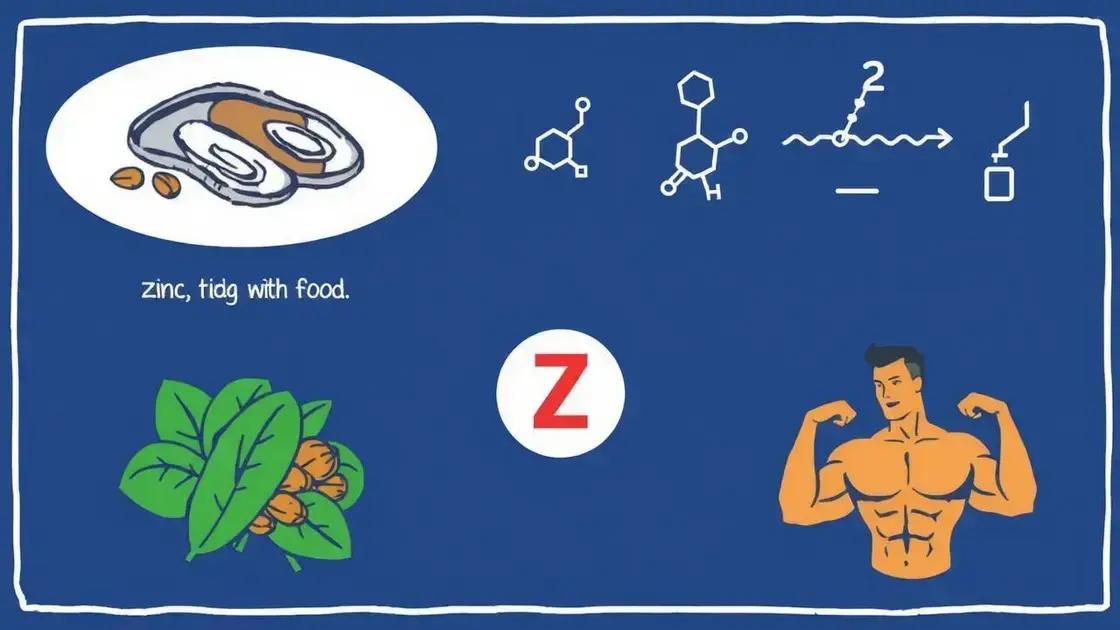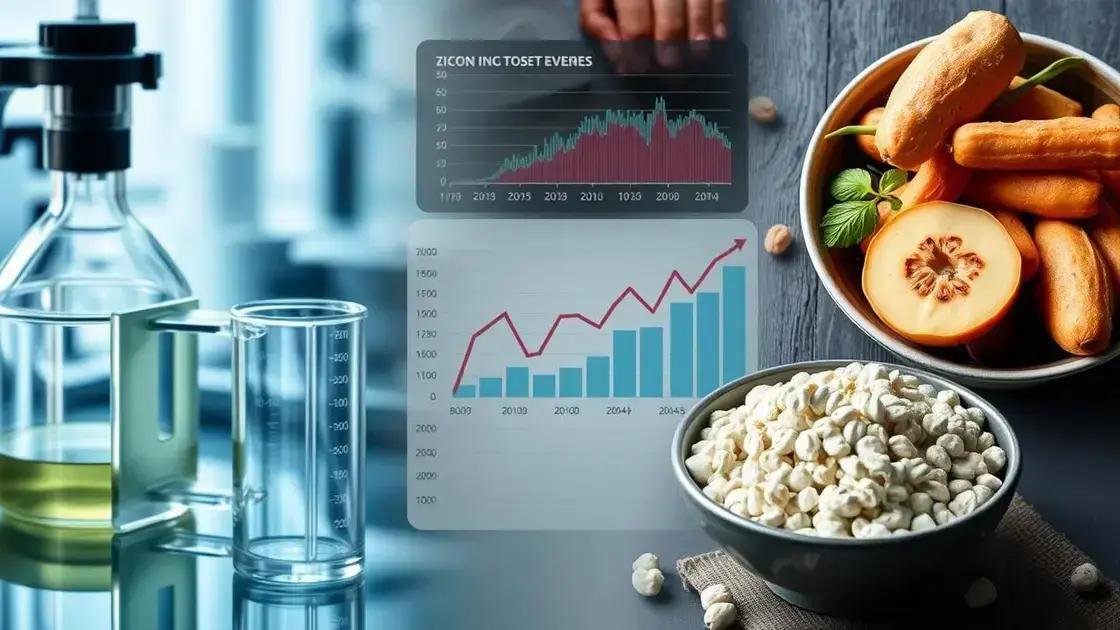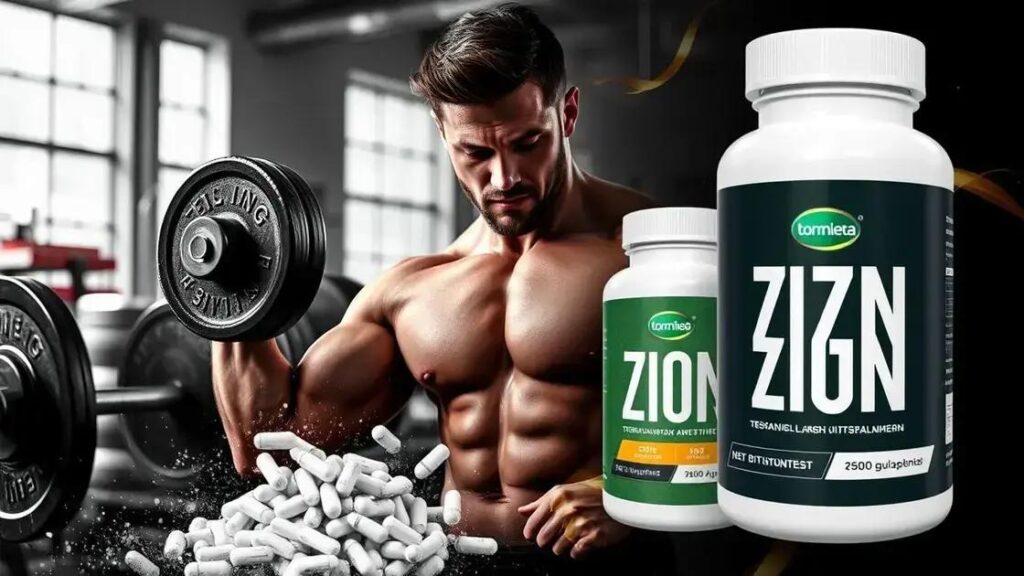The role of zinc in boosting testosterone levels is significant, as it supports hormone production and is vital for male health. Natural sources like meat, seafood, and legumes provide adequate zinc, while safe supplementation can enhance testosterone levels. Consulting a healthcare provider is essential for proper dosage and to avoid side effects.
Understanding the link between zinc and testosterone levels is essential for boosting men’s health. Zinc plays a pivotal role in testosterone production; without it, hormonal imbalances can occur, leading to fatigue and decreased libido. In this article, we will delve into how zinc influences testosterone levels, explore research backing these claims, and highlight natural sources to enhance your intake. You’ll also discover simple tips for safe supplementation. Let’s unlock the benefits of zinc together.
Understanding Zinc and Testosterone Connection

The connection between zinc and testosterone is vital for maintaining male health. Zinc is an essential trace mineral found in various foods and is crucial for the production of testosterone. A deficiency in zinc can lead to lower testosterone levels, impacting several aspects of health, including energy, mood, and libido.
How Zinc Affects Testosterone Levels
Zinc plays a role in different hormonal processes in the body. It helps regulate the pituitary gland’s function, which, in turn, influences the production of hormones, including testosterone. Research shows that low zinc levels can result in decreased testosterone synthesis. Hence, ensuring adequate zinc intake is important for maintaining optimal hormone levels.
Signs of Zinc Deficiency
Common signs of zinc deficiency include fatigue, lack of motivation, changes in mood, and reduced sexual desire. Additionally, men may experience muscle weakness and difficulties in concentrating. Recognizing these symptoms can help prompt an evaluation of dietary intake and zinc levels.
Clinical Studies on Zinc and Testosterone
Clinical studies have highlighted zinc’s impact on testosterone levels. For instance, one study demonstrated that supplementing with zinc significantly raised testosterone levels in men who were previously deficient. This finding underscores the importance of zinc for men, especially during periods of stress or aging when hormone levels may naturally decline.
Optimizing Zinc for Healthy Hormones
To maintain healthy testosterone levels, focus on consuming foods rich in zinc. Incorporating zinc-rich foods into your diet can provide the necessary nutrients for testosterone production. Also, consider the balance of other vitamins and minerals in your diet, as they all work together to support overall hormonal health.
Scientific Research Supporting Zinc’s Effects

Numerous scientific studies have explored the effects of zinc on testosterone levels. For instance, research has shown that zinc deficiency can negatively impact testosterone production in men. A study published in the Journal of Nutrition highlighted how participants with low zinc levels experienced a decrease in serum testosterone levels.
Key Research Findings
In a controlled trial, researchers found that men who supplemented with zinc for six months saw a significant increase in their testosterone levels compared to a placebo group. This outcome emphasizes the importance of adequate zinc intake for maintaining healthy hormone levels.
Impact of Zinc Supplementation
Another study evaluated the effects of zinc supplementation on older men and revealed that those who took zinc had improved testosterone levels and muscular strength. The findings suggest that zinc can be particularly beneficial for aging men who may naturally experience a decline in testosterone.
Link to Male Fertility
A separate study indicated that zinc plays a critical role in male fertility. It was found that men with higher zinc levels had improved sperm quality and motility, which correlates with testosterone levels. This reinforces the idea that maintaining proper zinc levels is vital for overall reproductive health.
Further Research Directions
While current research supports a positive link between zinc and testosterone, further studies are necessary to determine the specific mechanisms by which zinc influences hormone production. Investigating different dosages of zinc and its long-term effects on hormonal health can provide deeper insights.
Natural Sources of Zinc for Optimal Levels

Including zinc-rich foods in your diet is essential for maintaining optimal levels of zinc, which supports testosterone production. Here are some natural sources of zinc:
Oysters
Oysters are among the richest sources of zinc. Just a small serving can provide several times the daily recommended intake. They are not only beneficial for testosterone but also for overall reproductive health.
Meat
Red meat, including beef and lamb, contains high amounts of zinc. It is also a good source of protein, making it a valuable addition to a balanced diet. Choose lean cuts to keep saturated fats in check.
Poultry
Chicken and turkey are excellent sources of zinc. They can be easily incorporated into various dishes, providing a healthy source of both protein and essential minerals.
Beans
For those following a vegetarian diet, beans are a great alternative. Varieties such as chickpeas, lentils, and black beans provide a good amount of zinc along with other important nutrients.
Nuts and Seeds
Nuts and seeds are also rich in zinc. Pumpkins seeds, sunflower seeds, cashews, and almonds are great snacks that offer health benefits beyond zinc.
Dairy Products
Dairy products, including cheese and yogurt, can provide zinc as well. They also offer calcium and protein, adding to their nutritional value.
Whole Grains
Whole grains such as oats, quinoa, and brown rice are another source of zinc. They also offer fiber, which is beneficial for digestive health.
By incorporating these foods into your meals, you can help maintain optimal zinc levels and support healthy testosterone production.
Tips for Supplementing Zinc Safely

When considering zinc supplements, it is important to do so safely. Here are some tips for supplementing zinc effectively:
Start with Food First
Before taking supplements, try to get zinc from your diet. Foods like meat, seafood, dairy, nuts, and whole grains are excellent sources. This approach helps obtain other necessary nutrients that aid in zinc absorption.
Consult Your Doctor
Always talk to your healthcare provider before starting a zinc supplement. They can assess your specific needs and determine if supplementation is necessary, especially if you have pre-existing health conditions.
Choose the Right Form
Zinc supplements come in various forms, including zinc gluconate, zinc citrate, and zinc picolinate. Each has different absorption rates, so consult your doctor to find the best option for your needs.
Follow Recommended Dosages
Do not exceed the recommended dosage of zinc. For most adults, this is around 11 mg per day for men and 8 mg for women. High doses can cause adverse effects, such as nausea or copper deficiency.
Avoid Taking with Certain Medications
Zinc can interact with certain medications, including antibiotics and diuretics. If you are on medication, discuss with your doctor whether it’s safe to take zinc supplements alongside them.
Monitor for Side Effects
Be aware of any side effects that may occur with zinc supplementation. Common effects include stomach upset and headaches. If you experience more severe symptoms, discontinue use and contact your healthcare provider.
Consider Timing
Taking zinc supplements on an empty stomach may enhance absorption, but some people may feel nauseous if they do. Experiment with timing to see what works best for your body.
In Conclusion: The Importance of Zinc for Testosterone Health
Understanding the role of zinc in boosting testosterone levels is crucial for maintaining overall male health. This essential mineral is a key player in hormone production and various bodily functions.
Incorporating natural sources of zinc into your diet, along with safe supplementation practices, can improve your testosterone levels and overall well-being. With adequate knowledge and careful monitoring, you can harness the benefits of zinc effectively.
Always remember to consult healthcare professionals before starting any new supplement to ensure that you are making the best choices for your health. Ultimately, by prioritizing zinc in your nutritional regimen, you help support your hormonal balance and vitality.
FAQ – Frequently Asked Questions about Zinc and Testosterone
What is the role of zinc in testosterone production?
Zinc is crucial for testosterone production. It helps regulate hormones and can enhance testosterone levels when adequate amounts are consumed.
What are natural sources of zinc?
Natural sources of zinc include oysters, red meat, poultry, beans, nuts, seeds, and dairy products.
How can I safely supplement zinc?
To safely supplement zinc, consult your doctor first, follow recommended dosages, and monitor for any side effects.
Can I get enough zinc from my diet?
Yes, most people can obtain sufficient zinc from a balanced diet rich in various foods, especially if they include ample protein sources.
What are the signs of zinc deficiency?
Signs of zinc deficiency may include fatigue, weakened immune function, hair loss, and reduced testosterone levels.
Is it safe to take zinc supplements long-term?
Long-term use of zinc supplements should be monitored by a healthcare provider, as excessive amounts can cause adverse effects.













